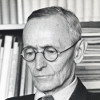“ The world has no beginning, and no limits in space, but is, in relation both to time and space, infinite. ”
Immanuel Kant, Critique of Pure Reason (1791). copy citation
| Author | Immanuel Kant |
|---|---|
| Source | Critique of Pure Reason |
| Topic | limit time |
| Date | 1791 |
| Language | English |
| Reference | |
| Note | Translated by J. M. D. Meiklejohn |
| Weblink | http://www.gutenberg.org/files/4280/4280-h/4280-h.htm |
Context
“We may consider an undetermined quantity as a whole, when it is enclosed within limits, although we cannot construct or ascertain its totality by measurement, that is, by the successive synthesis of its parts. For its limits of themselves determine its completeness as a whole.]
ANTITHESIS.
The world has no beginning, and no limits in space, but is, in relation both to time and space, infinite.
PROOF.
For let it be granted that it has a beginning. A beginning is an existence which is preceded by a time in which the thing does not exist. On the above supposition, it follows that there must have been a time in which the world did not exist, that is, a void time.”
source



